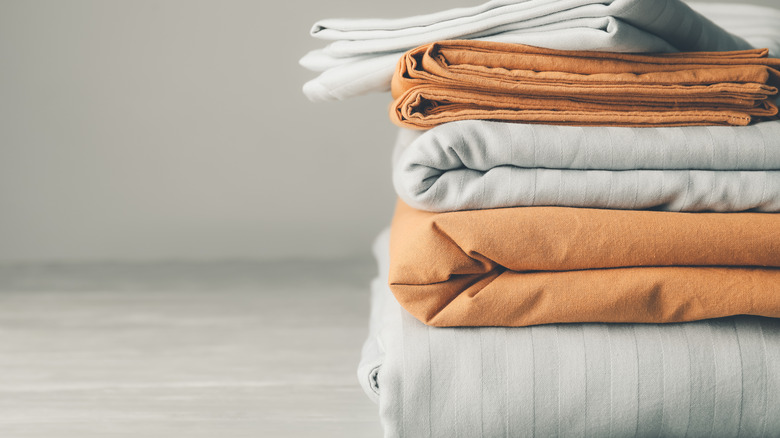Here's How Often You Should Replace Your Sheets
Have you ever thought about how often you should be replacing certain household items? If not, it's time to start. We use many items daily that eventually wear out or gather microbial particles that can pose a danger to you and your family and need to be disposed of. It may not come as a surprise that things like toothbrushes, sponges, and loofahs make the list of items that should be replaced regularly, but did you know that towels, shower curtains, and bed linens also have expiration dates?
BestLife gives some examples of common items around the house that you should replace after a certain period of time. Pillows are a magnet for body oils, dust mites, bacteria, and other microscopic particles that can harm your skin and respiratory tract if not replaced every two years or so. Towels are another important item to get rid of after two or three years of use as they cling to pathogens and molds. Due to their proximity to the toilet, they may even contain fecal matter — need we say more? You probably already know that kitchen sponges can't sit around forever, but did you know that their lifespan is just one week? And don't forget about your refrigerator's water filter. To effectively do its job, it needs replacing around the six to eight-month mark.
Bed sheets are another important item to routinely replace, even if you wash them regularly. Keep reading to find out how often.
It's probably time to replace your sheets
We use our beds more often than many other items in our home, and yet bed linens are severely overlooked when it comes to cleaning. The Sleep Foundation recommends washing bed sheets once per week, and more often than this if you allow your pets to sleep in the bed with you or if you have respiratory illnesses, like asthma. Like pillows, sheets are a breeding ground for dead skin cells, bacteria, dust mites, and a whole host of other nasty particles and bodily secretions. Unfortunately, most people do not wash their bedding often enough, let alone replace their sheets when they've reached their expiration date, which can cause illnesses, allergy flare-ups, and more.
House Beautiful gives sheets a mere two- to three-year lifespan, but the majority of folks hang on to their sheets for much longer than this. If purchasing a whole new set of sheets every couple of years isn't feasible for you, the good news is that there are ways to increase the lifespan of your linens. For example, you can alternate between different sets of sheets every time you wash your bedding to prevent overuse and take care not to blast them with hot water during washes as this wears out the fabric. Additionally, when not in use, make sure to store your sheets in a location with proper airflow, such as in a dresser or on a closet shelf.

